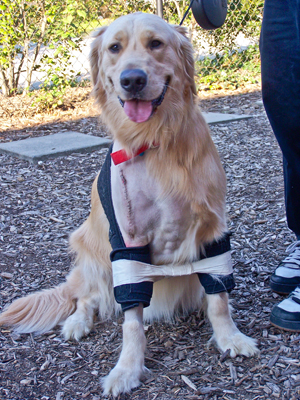After surgery:
Please see your pet’s discharge instructions for specific recommendations. Call or email with additional questions; please contact your local emergency clinic with urgent concerns after-hours.
drarthur@mobilevetsurgery.net
It is important that your pet rest after surgery.
- Recovery from orthopedic surgery typically requires strict rest for two to three months until healing is complete. Running, jumping, climbing furniture, and playing must be prevented during this time. Unsupervised time is best spent in crate confinement or in a small area without access to furniture or stairs. Time outside should be limited to short, leash-controlled walks for elimination.
- Following soft tissue surgery, activity should be limited for approximately three weeks while the surgery site heals.
Please monitor the incision for increased bruising and swelling or discharge. If any of these signs of inflammation develops, please call or email for advice. Because licking or chewing at the incision is detrimental, Elizabethan collars should be in place at all unsupervised times until the incision has healed. Elizabethan collars should also be used to protect bandages, since chewing or ingesting bandage material is detrimental.
Inflatable ProCollar Protective Collars are often a more pleasant alternative to lampshade Elizabethan collars. These collars are available at some pet stores and online at drsfostersmith.com. If you prefer to use an inflatable collar, please be sure that your pet can’t reach around the collar to the incision or bandage.
Bandages must be kept clean and dry: they must be covered with a plastic bag when your pet goes outside, and the bag needs to be removed each time your pet comes inside again. Please monitor bandages carefully for wetness, slipping, odor, or sudden irritation or discomfort. These could all be potential signs of irritation and would mean that an appointment for recheck examination and bandage change should be scheduled promptly.
Cold compresses applied to the incision will help decrease inflammation and improve comfort. This may be done as frequently as you choose, assuming your pet tolerates it easily, during the initial postoperative time.
Bowel movements may be delayed after illness, anesthesia, or surgery. Several days may be needed before the gastrointestinal system returns to normal, and bowel movements are likely to be small and infrequent until your pet is eating with a normal appetite. If you are concerned about constipation, canned pumpkin can be added to the food to help speed the process.
Please call or email if your pet seems painful, because individuals vary in their pain level and narcotic tolerance, and doses or medications can be adjusted.







